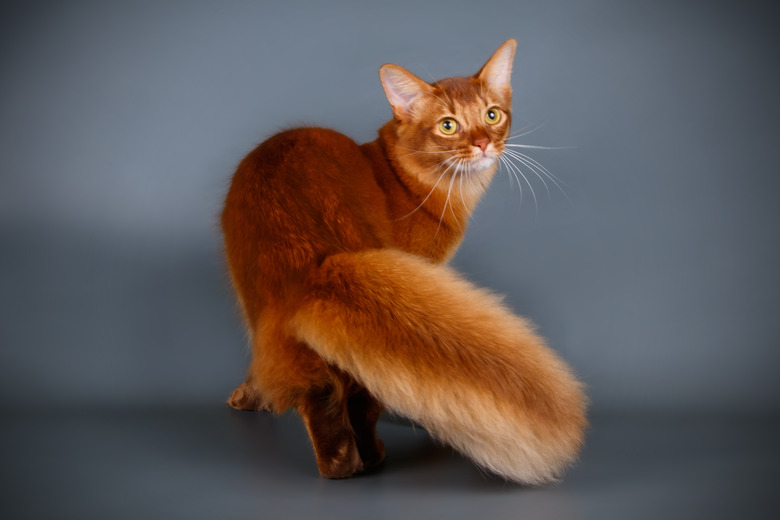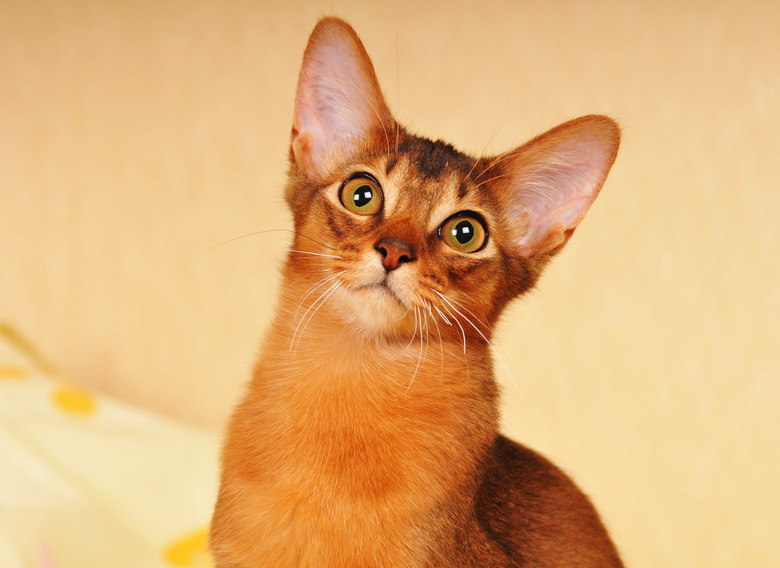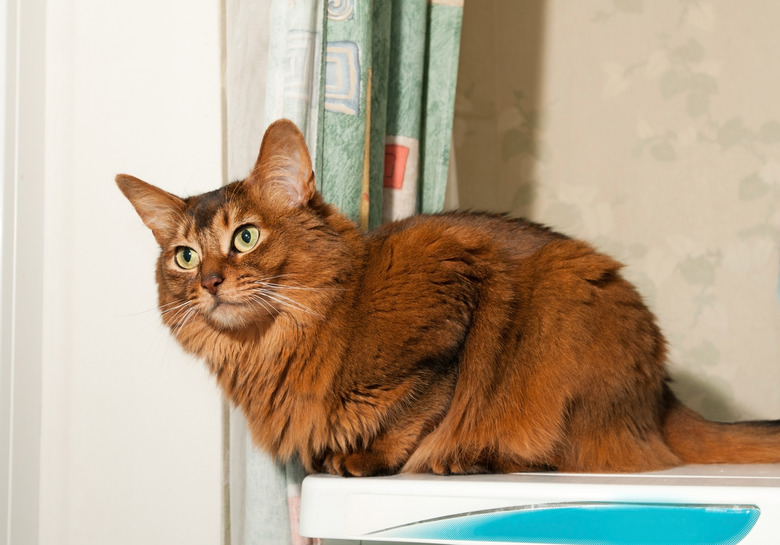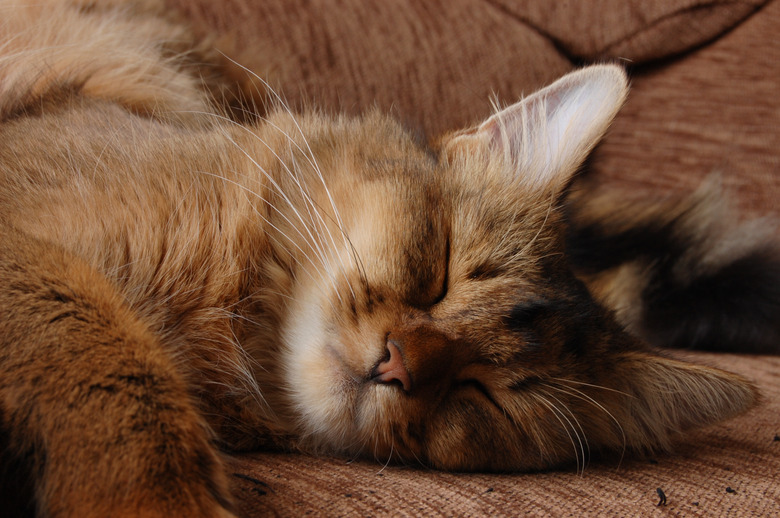Somali Cat Breed Characteristics
Somali cat quick facts
Somali cat quick facts
Length: 11 – 14 inches
Weight: Females: 6 – 8 pounds, males: 8 – 10 pounds
Lifespan: 10 – 19 years
Coat length: Medium
Coloring: Blue, cinnamon, chocolate, fawn, lilac, and ruddy with a ticking coat pattern, and gold or green eyes
Grooming needs: Medium
Friendliness: Breed alone is not an accurate predictor of individual cats' personalities. However, Somali cats are generally regarded as playful and social.
The Somali cat has earned the nickname "fox cat" for their big, bushy tails. Most of their coat is medium-length, but they have longer hair around the britches, ruff, stomach, and tail. With their stunning, ticked coat, large ears, and alert, almond-shaped eyes, the Somali cat is sure to capture your heart. The breed is active, playful, and affectionate, so make you sure understand the care requirements for a Somali cat before welcoming a new kitten into your home.
Somali cat history
Somali cat history
The Somali cat breed is a long-haired Abyssinian. The Abyssinian, or Aby, is an ancient cat breed whose exact origins are unknown. Some believe the breed descended from the sacred cats of Egypt. Another theory is that the Abyssinian cat originated in Abyssinia, an area that is now known as Ethiopia, and was brought to England by soldiers after the end of the Abyssinian war.
A recessive gene in the Abyssinian cat created long-haired cats but breeders are uncertain where the gene came from. The Somali cat was named after Somalia, the neighboring country to Ethiopia. The breed did not originate there but was given the name to show their relation to the Abyssinian breed from Ethiopia. The name was chosen by Somali cat breeder Evelyn Mague who owned and bred Aby cats that carried the long-haired gene.
Both the International Cat Association (TICA) and the Cat Fanciers' Association (CFA) recognize the Somali breed.
Somali cat personality
Somali cat personality
Somali cats are quite social and enjoy being an active part of the family. They are playful, curious, and intelligent cats and will explore every nook and cranny of your home, including bookshelves and the top of your refrigerator. Fortunately, they don't tend to be destructive in their explorations, so the items on your shelves are usually safe. Be aware that some cats do learn how to open cabinet doors or turn on faucets.
The cats may be able to entertain themselves, but they are extremely social and need your love and companionship to live truly happy lives. The cat may often follow you as you move around the home. They are too active to be considered lap cats, but that doesn't mean you won't have a cat on your lap when you sit down to read or watch television.
Some cats may need attention and cuddling before food. Somali cats also enjoy the companionship of other feline playmates, especially if the other cat is active and playful and willing to join in on the Somali's antics.
Somali cat lifespan and health issues
Somali cat lifespan and health issues
Healthy and well-cared-for cats can live into their late teens and even twenties. While the breed is generally healthy, there are some genetic cat health problems that may affect them. The Somali breed may suffer from early periodontal disease, so regular dental care is critical. Some other conditions that may affect Somali cats include:
- patellar luxation is a condition in which the kneecap moves out of its normal position and may cause lameness depending on the severity of the condition.
- renal amyloidosis is a disease that causes a build-up of amyloid proteins which prevents the kidneys from functioning properly.
- progressive retinal atrophy is a progressive eye disease that can lead to blindness
- pyruvate kinase deficiency is a condition that can cause the death of red blood cells and lead to anemia.
DNA testing is available for both progressive retinal atrophy and pyruvate kinase deficiency. Responsible breeders will test their cats and avoid breeding any that carry the genes for these conditions.
Somali cat grooming and care
Somali cat grooming and care
The Somali's coat is long and luxurious. Though fortunately, this long-haired breed rarely suffers from tangles and mats in their fur. Many cats do well with only occasional brushing but they often appreciate more frequent grooming as they enjoy the process and time with you.
Check and clean their ears and trim their nails regularly. Use veterinarian-approved toothpaste to brush their teeth. Have their teeth checked for gingivitis and periodontal disease at their regular veterinarian check-up each year.
Feed the cat high-quality commercial cat food twice per day in the amount recommended by your veterinarian. Some Somali cats greatly enjoy food and will overeat if you let them. Others are so active, you may need to provide them with an additional meal. Leave fresh drinking water out for your cat at all times.
Welcoming a new cat into your home
Welcoming a new cat into your home
Bringing a new Somali kitten or cat into your home is an exciting time and these affectionate cats will soon be an integral part of your family. It is important to start off on the right foot, so there are a few things to do to prepare for your new cat. Start by cat-proofing your home. Remove any dangerous plants and put away any items that may be dangerous to your cat. As you are cat-proofing the home, remember that these smart kitties may soon be opening cabinets and drawers.
Set up a single room for your Somali cat with the necessary items including:
- food and water
- litter box
- cat tree
- scratching post
- cat toys
Let your Somali cat explore and get comfortable in the room before opening the door and giving them more space to explore. Somali cats are affectionate but don't just grab your new cat to be held or petted before they are ready. Give them time and let them come to you for love and affection. Reward them with positive reinforcement to build trust and a loving relationship.
If you have other pets in the household, introduce the animals slowly. Make initial introductions through the door or a baby gate so that both animals are safe and you can ensure a positive experience for both animals. Before you know it, the friendly and sociable Somali cat will be a part of your family.



